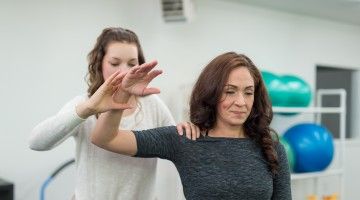MSD prevention
Musculoskeletal disorders (MSDs) refer to injuries of the muscles, ligaments and other soft tissues, including back, neck, shoulder and wrist pain. They are also known as repetitive strain injuries and cumulative trauma disorders. IWH conducts a wide range of research on MSDs—exploring how often they occur, what work-related factors contribute to them, their treatment and functional assessment, and the system- and workplace-level prevention and return-to-work programs that can help prevent and manage them.
Featured

Video
Participatory approach to health and safety in long-term care
Involve front-line staff when identifying and controlling hazards at long-term care homes. Those who do a job every day know the associated hazards best. A participatory approach can help prevent injuries.
Published: October 2, 2019

At Work article
Preventing upper extremity MSDs: What the latest research says
IWH systematic review recommends workplace-based resistance training to help prevent and manage upper extremity musculoskeletal symptoms and disorders
Published: November 2014
IWH Speaker Series
IWH Speaker Series
Preventing musculoskeletal disorders: Findings from a systematic review update
Workers in all industries are vulnerable to painful and potentially disabling injuries and disorders of the neck, shoulders, upper arms, forearms, elbows, wrists and hands—areas known as the upper extremities. The Institute for Work & Health (IWH) has conducted a systematic review on the effectiveness of workplace intervention programs to prevent and manage upper extremity musculoskeletal disorders (MSDs). In this plenary, the team shares the updated findings and the key messages from the latest research available.
Published: June 2014

At Work article
Work-related musculoskeletal disorders on the decline in Ontario
Province-wide surveillance study finds drop in MSDs between 2004 and 2011
Published: May 2014
IWH Speaker Series
IWH Speaker Series
Movement analysis of firefighters using gaming and simulation technology
The work firefighters do can be very physically demanding, putting them at risk of musculoskeletal injuries (MSI). In this plenary, Tara Kajaks presents her research on the use of gaming and simulation technology to ergonomically assess firefighters in their training environment. In addition to presenting the study results, she also discusses the strengths and weaknesses of this technology for field-based movement analysis and ergonomics assessment.
Published: March 2014
At Work article
At Work article
Study finds supporting learner confidence to apply new skills key to effective training
IWH trial of office ergonomics training also finds little difference between in-person and online training
Published: February 2014

Research Highlights
Pain and long-term absences among Canadian nurses with MSIs
Two important factors associated with how long Canadian female nurses stay off of work due to musculoskeletal injuries (MSIs) are the level of pain and the extent to which pain interferes with job duties.
Published: January 2013
At Work article
At Work article
The mouse that roared: Quivering mouse may reduce shoulder pain
A vibrating computer mouse that reminds users to move their hands and rest their arms eases office workers’ shoulder pain, but gets mixed reviews from users in a pilot study conducted by researchers at the Institute for Work & Health.
Published: October 2012
At Work article
At Work article
Show and tell: Visual symbols inform vulnerable workers about MSDs
Visual symbols or pictograms, along with training, are a promising approach to protect vulnerable workers from musculoskeletal disorders, according to a collaborative evaluation involving the Institute for Work & Health.
Published: July 2012
At Work article
At Work article
Thumbs down: MSK symptoms and hand-held devices
If you use a hand-held device such as a BlackBerry or an iPod, do you experience hand or neck pain? If you answered, “yes,” you’re likely not alone.
Published: February 2011

Research Highlights
Changes in physiotherapy use for MSDs highlight inequality of access
Physiotherapy use and costs to treat musculoskeletal disorders (MSDs) at a large Ontario workplace increased substantially over a 10-year period. The potential exists for unequal access to physiotherapy services among workers not privately insured or covered by their workplaces.
Published: January 2011